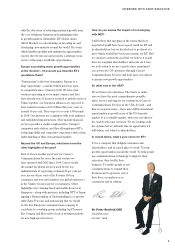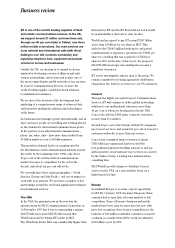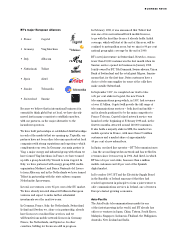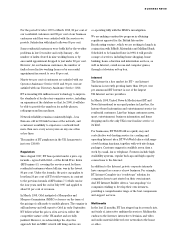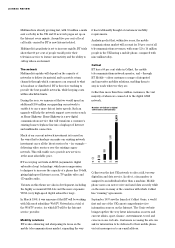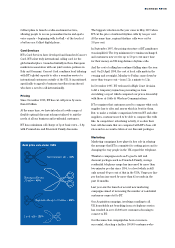BT 1998 Annual Report Download - page 13
Download and view the complete annual report
Please find page 13 of the 1998 BT annual report below. You can navigate through the pages in the report by either clicking on the pages listed below, or by using the keyword search tool below to find specific information within the annual report.B U S I N E S S R E V I E
live independently. And, as part of the BT Hear for All
programme, we have been working with the Royal
National Institute for Deaf People to improve deaf
people’s access to arts venues around the country.
In March 1998, we announced that BT would be one of
the corporate sponsors of the Millennium celebrations,
not just at the Dome in Greenwich but throughout the
country. Because we want to make a contribution that
will touch everyone’s lives in 2000, we will be launching
“Mill-e-Mail” – a free electronic mail address service.
This means that everyone in the UK over the age of
nine will have his or her own e-mail account.
Education
BT has been a key player in the establishment of a
“national grid for learning” in the UK. The aim of the
grid is to provide networked access to learning resources
for pupils and students of all ages, largely via personal
computers located in schools, colleges and libraries.
The development of the grid has been influenced by
the Bristol Education Online Network project, in which
BT, working with ICL, has been a major participant.
The project, benefiting a group of schools in the
Bristol area, has demonstrated the gains which can
be made by pupils who are given access to leading-edge
computers, servers, software and networks. As well as
improvements in academic attainments, the schools
reported a decline in vandalism and an increase in
parental involvement.
In October 1997, the Prime Minister announced a
public/private partnership to provide schools with
affordable access to the Internet. He said it would mean
that, by 2002, all of the UK’s 32,000 schools would have
“modern computers, education programmes to go on
them, teachers skilled to teach on them, pupils skilled to
use them, connected to the superhighway for free and
with phone bills… as low as £1 per pupil per year.”
CampusWorld, BT’s Internet-based resource of more
than 20,000 pages of educational material, receives
more than 100,000 page requests every school day.
BT has one of the most wide-ranging programmes of
community support in the education sector and invests
around £3 million each year through, amongst other
things, award schemes for schools, colleges and
universities.
for dialogue with representatives from the UK and
all our other European operations. The Council is
chaired by Chief Executive Sir Peter Bonfield and
meets annually.
Corporate citizenship
BT is committed to being a good corporate citizen.
We were a founder member of the Per Cent Club in 1986,
and we continue to commit a minimum of 0.5 per cent of
our UK pre-tax profits to activities in support of society
through our Community Partnership Programme. Our
expenditure has grown from £10 million in 1987 to
£15 million in 1998, including total donations to charity
of £2.6 million. No contributions were made to any
political party.
BT’s Community Partnership Programme is the largest of
its kind in the UK and concentrates its efforts in the areas
of health and welfare, education, regeneration, arts and
sports, disability, supporting the community activities
of BT people, and the environment. We place particular
emphasis on education and training, the improvement of
communication skills, support for people with disabilities,
and the involvement of BT people.
BT is the lead sponsor of the Department for Education
and Employment’s “out-of-school-hours clubs” project,
which was launched in February 1998. Our funding of
£150,000 will enable eight consortia of schools, youth
and community organisations across England to establish
homework clubs, with adult supervision, for
disadvantaged children.
And, every year, 50,000 swimmers take part in the UK’s
largest participative sporting event, the BT Swimathon,
which is also our most successful event for generating
media coverage. In eight years, it has raised over
£10 million for national charities.
In the last year, we have put in place a programme to
enable charities and voluntary groups to make more
effective use of communications technology. As part
of this, we are collaborating with the charity OneWorld
On Line to offer training and support for small charities
to help them run their own Internet sites.
BT is also bringing the benefits of the new technology it is
developing to the people who need it most. For example,
BT and the Anchor Trust are developing remote health
monitoring systems to help older people continue to




